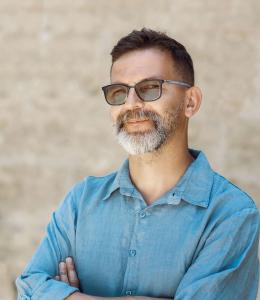
Professor Egdūnas Račius
IASH-Alwaleed Research Fellow, March - May 2024
Home Institution: Vytautas Magnus University
Egdūnas Račius (PhD in Arabic and Islamic Studies, University of Helsinki, 2004) is Professor of Middle Eastern and Islamic studies at Vytautas Magnus University (Kaunas, Lithuania). Currently, he is a Visiting Fellow at Prince Alwaleed Bin Talal Centre of Islamic Studies, University of Cambridge (Cambridge, UK) and an IASH-Alwaleed Research Fellow at the Institute for Advanced Studies in the Humanities, University of Edinburgh (Edinburgh, UK). He is the Reviews Editor of the Journal of Muslims in Europe and a co-editor of the Yearbook of Muslims in Europe (both by Brill). His research interests encompass Eastern European Muslim communities and governance of religion (particularly Islam) in post-communist Europe. Račius is the author of Muslims in Eastern Europe (Edinburgh University Press, 2018) and Islam in Post-Communist Eastern Europe: between Churchification and Securitization (Brill, 2020). He was (2018-2022) the Lithuanian team leader in the Horizon 2020 project “Radicalisation, Secularism and the Governance of Religion: Bringing together European and Asian Perspectives (GREASE)” and is presently the Lithuanian team leader in another Horizon 2020 project “DIGITISLAM: Digital Islam across Europe – Understanding Muslims’ Participation in Online Islamic Environments.” Prof. Račius is a consultant to numerous Lithuanian state institutions and NGOs on questions of immigration, integration, religious radicalization and securitization of Islam in Europe.
Project title: From Imperial Muslim Administrations to National Muslim Churches: Trajectories of the Development of Muslim Ecclesiastical Administrations in post-Communist Eurasia
The project 'From Imperial Muslim Administrations to National Muslim Churches: Trajectories of the Development of Muslim Ecclesiastical Administrations in post-Communist Eurasia' is of a comparative nature and is aimed at tracing the birth and evolution of post-colonial national Muslim Churches in South-Eastern Europe and Central Asia. The nation states in both regions are effectively post-colonial and governance of religion in general and of Islam in particular in them often bears heavy traits of colonial (respectively, imperial Russian and Austro-Hungarian) rule. Both former empires sought to control religiosity and religious authority of minority (in this case, Muslim) faith communities through founding, if not state-run then tightly state-controlled, religious institutions, which incidentally resembled structures of Christian Churches. Those institutions survived the communist intermezzo to become, in the post-communist era, effectively national Muslim Churches. The project chiefly focuses on their ecclesiastical structures – educational contents and process of training and subsequent appointment of imams, their career trajectories, state’s involvement in the system and also promotion of unitary form of state-endorsed Islamic religiosity as opposed to securitization of unwanted forms of Islamic religiosity in the countries under research. Three Balkan (Bosnia and Herzegovina, North Macedonia and Bulgaria) and three Central Asian (Kazakhstan, Uzbekistan and Kyrgyzstan) countries have been chosen for the research.
The conceptualization of churchification of Islam and ‘national Muslim Churches’ is a novel approach in the field of the broader Islamic studies and in particular in the field of the governance of religion (Islam) in both, Muslim minority and majority settings. The research will contribute to a more nuanced understanding of not only how Islam in certain (post-colonial) nation states is institutionalized but also of intra-community dynamics where the hitherto held notions of ‘church-less’ Islam are increasingly becoming (if not already have become) obsolete and where the (formerly arguably cherished) plurality of the forms of Islamic religiosity is forsaken for a unitary, state-endorsed form of it.
The project is a follow-up to the project on churchification of Islam in post-communist Eastern Europe (the results of which were published as a manograph in 2020 (https://brill.com/display/title/57060?language=en)). It involves both fieldwork (a pilot visit to Kazakhstan was made in March 2023) in the respective countries and desk research, which would cover collection and analysis of available printed materials in libraries and archives, including at western universities.
